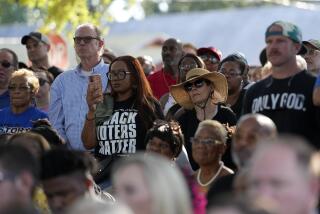Teen-ager’s Death Outrages Blacks in Toledo
- Share via
TOLEDO, Ohio — On a Monday morning when most people were returning to work, the Rev. Floyd Rose and his supporters gathered at the Ottawa River to remember a 16-year-old black teen-ager who drowned in the muddy water.
“He did not have to die,” Rose, pastor of the Family Baptist Church, said after Robert Thomas’ mother, Diane, placed a wreath in the water where her son died. His death has sparked a new wave of civil rights demonstrations in this northwestern Ohio city.
Thomas, who was described as afraid of water, drowned July 26 after he jumped into the river while being chased by a white University of Toledo police officer.
Citizens Outraged
The prayer vigil Aug. 7 attracted 100 people who were outraged because there was about an hour’s delay before fire division water rescue workers were contacted to begin a search for the boy.
Rose, the most visible of Toledo’s civil rights leaders, promises to keep the pressure on city officials until questions surrounding the boy’s death are answered. Police and fire officials say proper procedures were followed, but refuse to comment further while the investigation is pending.
“The city always takes the African-American community for fools,” Rose said. “Had they told us that there was a breakdown in communication by the police and fire departments and apologized for the error, we would have understood.
“But the city never apologized to anyone. Instead, they said everyone followed proper procedures and tried to say Robert was a criminal, even though he wasn’t charged with anything. Instead of being conciliatory, they have been arrogant.
“We’ve backed down before, but not this time.”
Refuse to Meet
About 17% of the city’s 340,000 residents are black.
City leaders, led by Mayor Donna Owens, have tried to meet with Rose and several other key activists to defuse the unrest, but those efforts have been rebuffed.
“Every time the city wants something from us they call a meeting,” Rose said. “But when we try to discuss problems facing the city--our concerns--they claim we’re being unreasonable.”
Owens said the point of meeting is to move beyond rhetoric and start dealing with issues.
“I think it’s time that Rose and everyone else starts considering the safety and concerns of all of our citizens in this community and that we work together in building positive relationships,” she said.
Hiring Practices
Since the early 1970s, an advocacy group has been monitoring the hiring practices of the city’s police and fire departments, which are under federal court order to hire more minorities.
Racial tensions flared in June, 1988, after City Manager Philip Hawkey, who is white, dismissed one black official and suspended two other blacks he accused of mismanaging the city’s housing programs.
After public hearings late last year, the Ohio Civil Rights Commission and the city signed an agreement July 28 that Toledo will hire and promote more minorities and women. A report on Toledo’s race relations is pending from the Ohio Advisory Committee to the U.S. Civil Rights Commission, also as a result of those hearings.
In March, controversy over sexist and racist remarks allegedly made by Fire Chief William Winkle brought many white leaders into the movement.
Winkle was suspended for 20 days for making a sexist remark about a female city employee. Later, the city released a 1982 report that said firefighters heard Winkle praise Adolf Hitler and support lynching blacks.
Winkle rarely talks publicly about the allegations, which he has denied. He did not return a telephone message seeking additional comment.
‘Intangible Prejudice’
“A lot of the prejudice is intangible,” Rose said. “The kind of prejudice in Toledo isn’t like the segregation in the South. Many people in the white community couldn’t put their fingers on why we felt the way we did. Then they saw Winkle, his attitude and the city’s unwillingness to take any action. Now they know.”
Thomas’ drowning opened new wounds. Authorities say he jumped into the river to elude officers pursuing him and three others suspected of trying to steal several cases of soda from a convenience store near the University of Toledo. The other suspects were not apprehended.
Rose said if Thomas had been white, rescuers would have been sent much sooner.
The FBI is investigating whether Thomas’ civil rights were violated before he jumped in the rain-swollen river.
Hawkey said a report on the incident should be complete soon. He said police and fire personnel followed procedures.
Councilman Jack Ford, who is black, said the drowning made more people aware of racial tension in the city.
More to Read
Sign up for Essential California
The most important California stories and recommendations in your inbox every morning.
You may occasionally receive promotional content from the Los Angeles Times.










